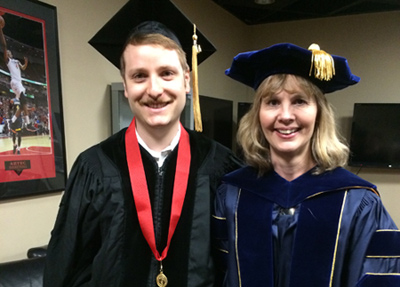
I. Introduction
Preparing for a thesis defense is a crucial step towards earning a graduate degree. This blog will guide you through the process, from understanding the importance of the defense to tips on how to ace it.
The importance of the thesis defense
The thesis defense is your chance to showcase your research and demonstrate your expertise in your field of study. It is an opportunity to present your findings, discuss your methodology, and answer questions from your thesis committee. The defense allows you to demonstrate that you have mastered your subject and can be considered an expert in your field.
How it contributes to the completion of a graduate degree
Successfully defending your thesis is a critical requirement for earning a graduate degree. It is the final step in the process and validates the hard work and dedication you have put into your research. A successful defense indicates that your thesis meets the academic standards of your institution and contributes to the existing knowledge in your field.
Now that we understand the importance of the thesis defense, let's move on to the next section: “II. Preparing for the Defense.”
Stay tuned for valuable tips and strategies to help you prepare for a successful thesis defense. [1][2][3][4]

II. Preparing for the Thesis Defense
Defending your thesis is a crucial step in completing your graduate degree. It is an opportunity for you to showcase your research and demonstrate your understanding of your field of study. Here are some essential steps to help you prepare for a successful thesis defense:
Understanding the requirements and expectations
- Familiarize yourself with the specific requirements and guidelines set by your department or institution for the thesis defense.
- Review the evaluation criteria that will be used by the committee to assess your work.
- Seek clarification from your advisor or committee members if you have any doubts or questions regarding the process.
Organizing and practicing the presentation
- Create a clear and well-structured presentation that highlights the key aspects of your research.
- Use bullet points and visuals to help convey your ideas effectively.
- Practice your presentation multiple times to ensure a smooth and confident delivery.
- Time yourself to ensure that you fit within the allocated time frame.
Revisiting the research and key findings
- Review your entire thesis to refresh your memory on the details of your research.
- Focus on the main objectives, methodologies, and findings of your study.
- Prepare concise summaries of your key findings and their implications.
- Anticipate potential questions that may arise and think of coherent answers.
During the defense, remember to maintain a calm and confident demeanor. Listen carefully to the questions asked by the committee and make sure to answer them thoughtfully and comprehensively. If you encounter a question that you don't know the answer to, be honest and open about it. Offer alternative perspectives or suggest further research that could address the question.
By adequately preparing for your thesis defense, you can demonstrate your expertise and contribute to the body of knowledge in your field. Remember that the defense is an opportunity for you to shine and showcase your hard work and dedication. Good luck! [5][6][7][8]

III. The Structure of the Thesis Defense
When it comes to your thesis defense, having a well-structured presentation is key to successfully conveying your research and demonstrating your expertise. Here is a breakdown of the typical structure of a thesis defense:
Opening remarks and introduction
- Start by greeting the audience and introducing yourself as the presenter.
- Thank the committee and any other attendees for their presence.
- Briefly outline the purpose of your presentation and what you aim to achieve.
Presenting the research methodology and process
- Provide an overview of your research methodology, explaining the approach you took to gather data and analyze it.
- Discuss the tools and techniques used in your research, highlighting their relevance and effectiveness.
- Emphasize the rigor of your research process, demonstrating your ability to conduct high-quality academic work.
Highlighting the key findings and contributions
- Present the main findings of your study, focusing on the most significant and impactful results.
- Explain how your findings contribute to the existing body of knowledge in your field.
- Highlight any novel insights or discoveries that your research has uncovered.
Addressing potential limitations and challenges
- Discuss any limitations or challenges you encountered during your research, such as sample size limitations or data collection difficulties.
- Explain how you mitigated these limitations and their potential impact on your findings.
- Demonstrate your ability to critically analyze your research and provide alternative interpretations or solutions.
Handling questions from the committee
- Be prepared to answer questions from the committee members and other attendees.
- Listen carefully to each question, taking a moment to gather your thoughts before responding.
- Be concise and confident in your answers, providing evidence and examples to support your statements.
By following this structure, you can effectively showcase your research and demonstrate your expertise during your thesis defense. Remember to practice your presentation beforehand, seeking feedback from your advisor or colleagues to ensure clarity and coherence.
As you prepare for your thesis defense, it is also helpful to familiarize yourself with the specific requirements and customs of your institution. This will ensure that you meet all necessary guidelines and expectations.
Now that you have a solid understanding of how to structure your thesis defense, you can confidently defend your ideas and conquer your dreams of completing your graduate degree. Good luck! [9][10][11][12][13][14][15][16][17][18]

IV. Managing Nerves and Building Confidence
Going into your thesis defense, it's natural to feel nervous and anxious. However, with the right strategies, you can overcome these feelings and build confidence in presenting your ideas. Here are some strategies to help you manage nerves and boost your confidence:
1. Strategies for overcoming anxiety and stress
- Practice deep breathing exercises or meditation techniques to calm your nerves before your defense.
- Visualize yourself successfully presenting your thesis and answering questions confidently.
- Stay organized by creating a checklist of tasks to complete before your defense to alleviate stress and ensure preparedness.
- Take breaks and engage in activities that help you relax and unwind, such as going for a walk or practicing a hobby.
2. Visualizing success and positive outcomes
- Use the power of visualization to imagine yourself delivering a successful defense and receiving positive feedback from your committee.
- Create mental images of the presentation going smoothly and envision yourself confidently answering questions.
- Remind yourself of your accomplishments and the hard work you have put into your research, boosting your self-confidence.
3. Seeking support and feedback from peers and mentors
- Share your concerns and anxieties with your peers who have already gone through the defense process. Their insights and experiences can help alleviate your worries and offer valuable advice.
- Seek feedback from your mentor or advisor. Practice your defense with them and ask for their input on your presentation and speaking style.
- Join a support group or find a thesis defense buddy who can provide encouragement and a sense of camaraderie during this critical time.
Remember, confidence is key when defending your ideas. By managing your nerves, visualizing success, and seeking support, you can enter your thesis defense with the confidence needed to conquer your dreams.
Source: https://www.editage.com/insights/what-can-i-do-to-ensure-that-my-thesis-defense-is-successful [19][20][21][22][23][24]

V. Tips for Answering Questions Effectively
Defending your thesis in a thesis defense can be a nerve-wracking experience, but with the right preparation and mindset, you can conquer it with confidence. One crucial aspect of a successful defense is effectively answering the questions posed by your thesis committee. Here are some tips to help you give clear and concise responses:
Active listening and understanding the question
Listening attentively to the question is the first step in answering effectively. Take a moment to process the question and make sure you understand what is being asked. If you're unsure about anything, don't be afraid to ask for clarification. It's better to take a moment to understand the question fully than to give an incorrect or vague answer.
Clarifying the question if needed
If the question is unclear or too broad, it's okay to ask for further clarification. This shows your engagement and commitment to providing an accurate response. Restating the question in your own words can also help ensure that you have understood it correctly.
Providing clear and concise responses
When answering the question, aim to be clear and concise in your response. Avoid going off on tangents or providing unnecessary information. Stick to the point and give a direct answer. If the question has multiple parts, consider breaking down your response into subsections for better clarity.
Backing up answers with evidence and examples
Supporting your answers with evidence and examples from your research can greatly strengthen your response. Reference specific studies, data, or experiments that back up your assertions. This demonstrates your knowledge and understanding of the topic and shows that your conclusions are based on solid evidence.
Remember, your thesis defense is an opportunity to showcase your expertise and academic prowess. By actively listening, clarifying questions, providing clear and concise responses, and backing up your answers with evidence, you can confidently tackle the questions from your thesis committee and emerge victoriously. Good luck!

VI. Handling Challenging Situations
Dealing with unexpected or difficult questions
During your thesis defense, it is common to face unexpected or difficult questions from your committee members. These questions are designed to test your knowledge, critical thinking skills, and ability to defend your ideas. Here are some tips to help you navigate these challenging situations:
-
Stay calm and composed: Take a deep breath and remind yourself that you have prepared extensively for this moment. Remember, your committee members are not trying to undermine you but rather to ensure that you have a thorough understanding of your research. Stay confident and collected throughout the defense.
-
Listen carefully: Pay close attention to the question being asked. Take a moment to fully understand the question before providing an answer. If you are unsure about the question, politely ask for clarification. Remember, it is better to ask for clarification than to provide an incorrect or irrelevant response.
-
Take your time: Don't feel rushed to answer the question immediately. Take a moment to gather your thoughts and formulate a clear and concise response. It's okay to pause and think before answering. Your committee members will appreciate a well-thought-out answer.
-
Be honest and transparent: If you don't know the answer to a question, it is better to admit it rather than trying to bluff your way through. Honesty and transparency are valued in academic settings. Use this opportunity to demonstrate your ability to critically analyze and reflect upon your work.
-
Stay focused on your research: When faced with difficult questions, it is essential to stay focused on your research. Remember your main findings, the methodology you used, and the significance of your work. Connect the question back to your research and explain how it relates to your overall thesis.
Staying calm and composed throughout the defense
Defending your thesis can be an overwhelming experience, but maintaining a calm and composed demeanor is crucial. Here are some strategies to help you stay calm during your defense:
-
Preparation is key: Thoroughly prepare for your defense by rehearsing your presentation, anticipating questions, and conducting mock defenses. The more prepared you are, the more confident you will feel on the day of your defense.
-
Practice relaxation techniques: It is normal to feel nervous before and during your defense. Practice relaxation techniques such as deep breathing, visualization, or meditation to help calm your nerves. Remember, stress and anxiety can affect your performance, so it is essential to take care of your mental well-being.
-
Trust yourself and your abilities: Remember that you have worked hard on your research, and your committee believes in your abilities. Trust yourself and your knowledge. Remind yourself of your achievements and be proud of your accomplishments.
-
Seek support: Surround yourself with supportive friends, family, or mentors who can provide encouragement and reassurance. Their presence and words of encouragement can help boost your confidence.
-
Maintain a positive mindset: Instead of viewing your defense as a daunting task, try to shift your perspective and view it as an opportunity to share your research and engage in intellectual discussions. Embrace the challenge and approach it with a positive mindset.
Remember, the defense is not only about proving your research but also about showcasing your personal growth and development as a researcher. Stay confident, stay focused, and embrace the opportunity to defend your ideas and conquer your dreams.
Reference:

VII. Celebrating Success and Reflecting on the Journey
After months or even years of hard work, it is time to celebrate the successful completion of your thesis defense. This moment marks a significant milestone in your academic journey and is worth acknowledging and cherishing. Take a moment to reflect on the challenges you faced and the growth you experienced throughout the process. Here are some ways to celebrate and reflect on this accomplishment:
1. Gather with Friends and Family
Invite your close friends and family members to celebrate this achievement with you. Share stories of your journey, acknowledge their support and encouragement, and express gratitude for their presence throughout the process.
2. Plan a Special Outing
Treat yourself to a special outing or activity that you enjoy. Whether it's a dinner at your favorite restaurant, a spa day, or a weekend getaway, take the time to relax and reward yourself for your hard work and dedication.
3. Reflect on the Process
Spend some time journaling or reflecting on your thesis defense journey. Consider the challenges you overcame, the lessons you learned, and the skills you developed along the way. Celebrate your growth as a researcher and scholar.
4. Connect with Peers
Reach out to your fellow graduate students who have also defended their theses. Share your experiences, celebrate each other's accomplishments, and offer support and encouragement. Connecting with peers who understand the process can be both comforting and inspiring.
5. Update Your Professional Profile
Update your professional profile, such as LinkedIn or your resume, to reflect your new status as a graduate. Highlight your thesis defense accomplishment and showcase the skills and knowledge you gained throughout the process.
6. Set New Goals
Now that you have successfully defended your thesis, it's time to set new goals for your academic or professional journey. Whether it's pursuing further research, applying for grants, or starting a new job, channel your newfound confidence and knowledge into future endeavors.
Remember, the thesis defense is not just a culmination of your hard work, but also a stepping stone for future achievements. Embrace the celebration, reflect on your journey, and seize the opportunities that lie ahead.